2022 Jeep Meridian review, test drive
The 7-seat Jeep Meridian is targeted at families looking for more space and flexibility, whilst retaining the Jeep DNA.
Published on May 01, 2022 02:15:00 PM
67,731 Views
Follow us on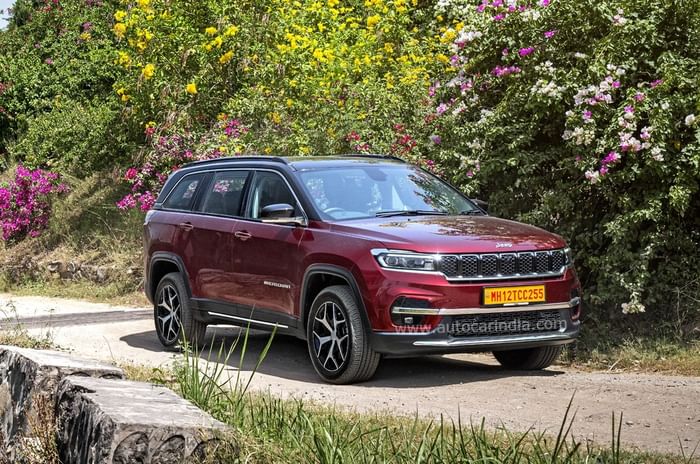
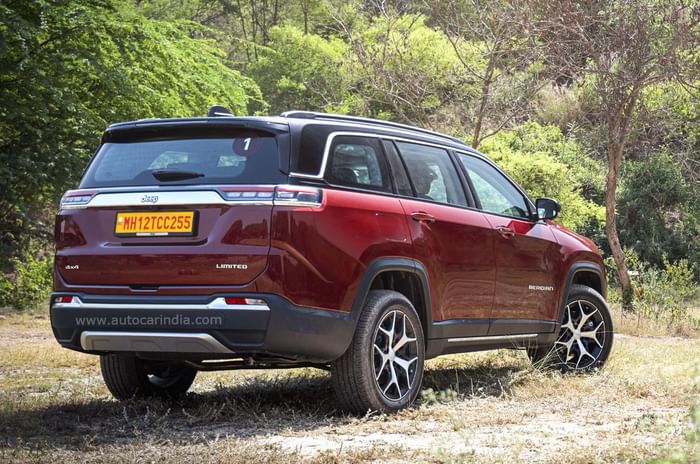
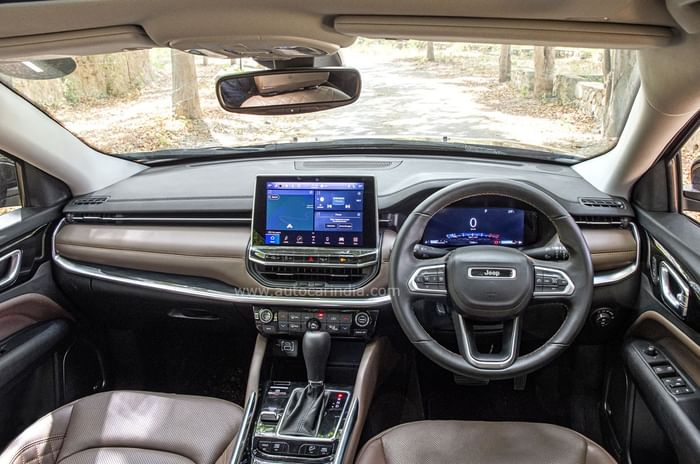
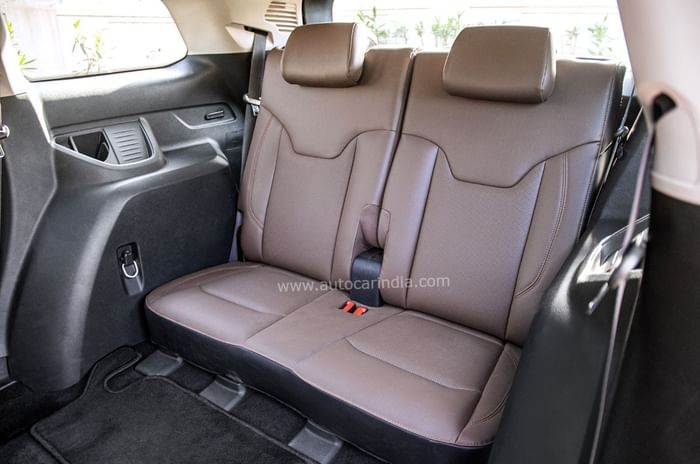
We Like
- Outstanding ride and handling
- 4X4 capability
We Don't Like
- Cramped third row
- No petrol option
The timing couldn’t be better. The Jeep Meridian arrives as the 7-seater category is seeing fresh action across multiple segments and soon after the exit of the Ford Endeavour, which has opened a small but crucial gap for the Meridian to fill. But most importantly, the Meridian is Jeep’s second mainstream model in India. Until now, the Compass, launched way back in 2017, was the sole pillar of Jeep in India on whose shoulders hinged the fortunes of the company. Niche models like the Wrangler and Grand Cherokee are good for image, but Jeep needed another volume model to gain critical mass in the fast evolving and growing Indian SUV market. So, will the Meridian click like the Compass did over five years ago and take some of the weight off its shoulders? That the Meridian is based on the Compass is a good starting point, but how well can it do to compete against the swell of other three-row SUVs that have hit the market at multiple price points in the past few years?
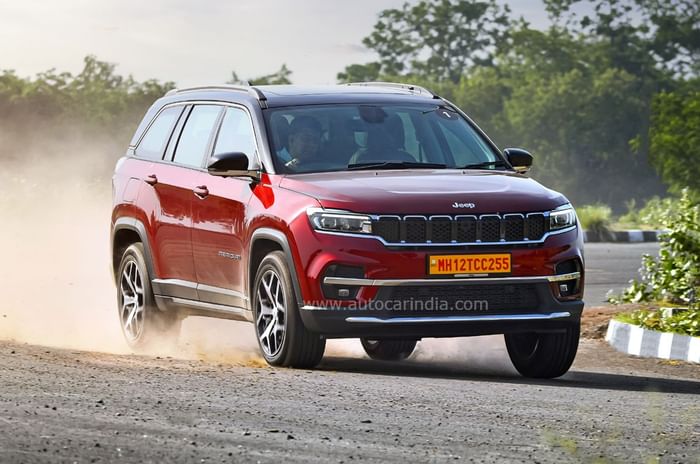
Jeep Meridian: exterior
With the Meridian, Jeep hasn’t simply bolted on a longer tail section to make a three-row variant out of the Compass, but creditably has re-modelled the entire car with a substantially longer wheelbase and new body panels. The Meridian is 4,769mm long, which is a good 364mm more than the Compass. A lot of that length comes from an extended wheelbase, which is a sizeable 2,782mm – 146mm more than the Compass. In fact, the Meridian’s wheelbase is the longest in its class, a tad more than even the Fortuner. And it’s the long wheelbase, along with the relatively short front and rear overhangs (critical for a Jeep’s off-road capability) that give the Meridian superbly balanced proportions. In fact, the Meridian is more Grand Cherokee-like than a stretched Compass, and that’s down to the rich detailing all round.
A good helping of chrome running along the underside of the familiar seven-slot grille and the top of the slim headlights nicely sets the Meridian apart as the Compass’ bigger brother. The two-tone roof with a blackened D-pillar and a chrome surround above the doors that nicely highlights the silhouette look very upmarket too, as does the slim rear tail-light clusters that are neatly integrated with the chrome strip. The Meridian’s smart set of 18-inch alloys and chunky 235/55 R18 tyres add to the road presence. The Compass was a good-looking car, and the Meridian looks even better. And looks in this segment is half the battle won.
| Jeep Meridian Price, Mileage, Specifications, Features and Variants | |
|---|---|
| Brand | Jeep |
| Model Name | Meridian |
| Jeep Meridian Price | ₹ 29.64 - 45.57 lakh |
| Jeep Meridian Range/Mileage | NA |
| Jeep Meridian Specifications | SUV | 5 doors | 7 seats View All Specs |
| Jeep Meridian Features | LED headlight | 10.1-inch Touchscreen display | 6 airbags View All Features |
| Jeep Meridian Variants | Longitude 2.0 Diesel MT 5 seat | Longitude Plus 2.0 Diesel MT 7 seat | Longitude 2.0 Diesel AT 5 seat View All Variants |
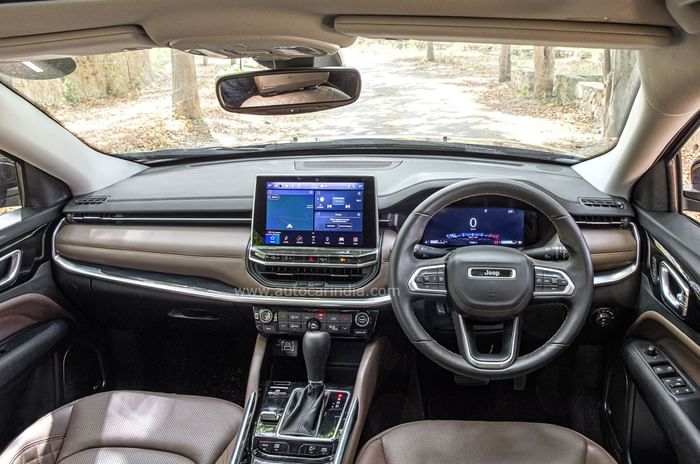
Jeep Meridian: interior
The dashboard is pretty much the same as the Compass and that’s not necessarily a bad thing, because the Compass itself received a major upgrade to the interior in 2021. The quality of materials, the solid door handles and chrome finishes, all exude an upmarket feel. However, a little bit more differentiation, other than the two-tone, brown and black colour scheme (the Compass is all black) and the differently stitched seats, would have been welcome. Also, some of the plastics lower down in the cabin and the seat base feel a bit hard and shiny, which stand out against the brown seat trim.
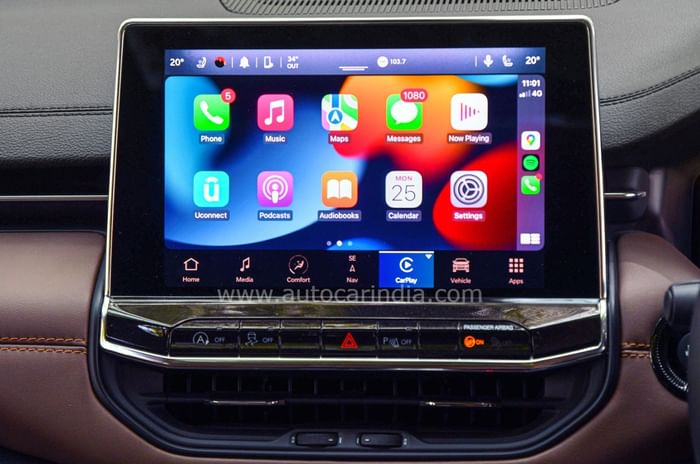
The all-digital dashboard is carried over from the Compass too, so you get a 10.25-inch digital instrument cluster with multiple displays, a 10.1-inch infotainment system that has wireless Apple CarPlay and Android Auto, a 360-degree camera that is crisp and sharp as ever, and one of the better interfaces around.
There’s front ventilated seats, wireless charging, driving modes, USB Type C and USB Type A ports, and a panoramic sunroof, which bags all the must-have features that SUV owners want. However, given where the Meridian will sit in the SUV market, a few more gizmos would have been in order. There are no front parking sensors or any ADAS features like adaptive cruise control, lane departure warning, which the XUV700 and Gloster have made the norm. In terms of practicality, there’s enough space to store your stuff on long trips, but the door pockets are a bit shallow to hold a 1.0-litre water bottle.
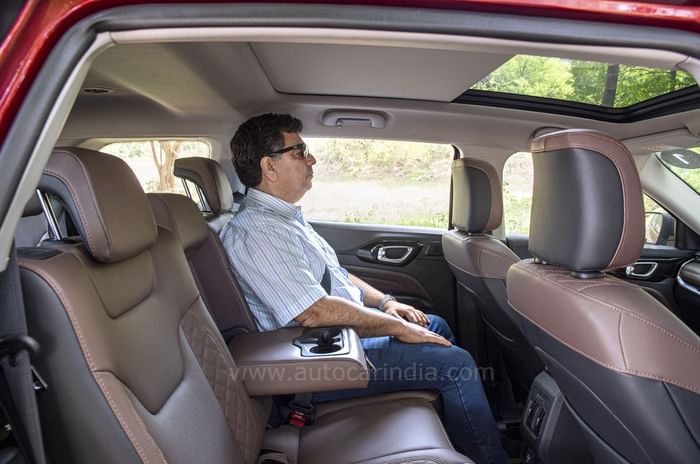
It’s when you move to the middle row that you can feel the change. Though legroom is similar to the Compass and the width is just a tad more, thanks to the slimmer door pockets (no place for big bottles here either), the seats are a big improvement. For one, you sit much higher than in the Compass, so automatically under-thigh support improves, which is further enhanced by the reprofiled seats that have a larger squab.
The high seating position and the large window makes it easier to look out, and this enhanced visibility is always welcome on long drives, as are the reclinable seat backs. However, unlike other 7-seaters, the middle row doesn’t slide, which is a shame because this could have given some much needed extra legroom. Bear in mind that the Meridian’s rear seat isn’t particularly wide, a common complaint with the Compass, and hence, travelling three up can be restrictive.
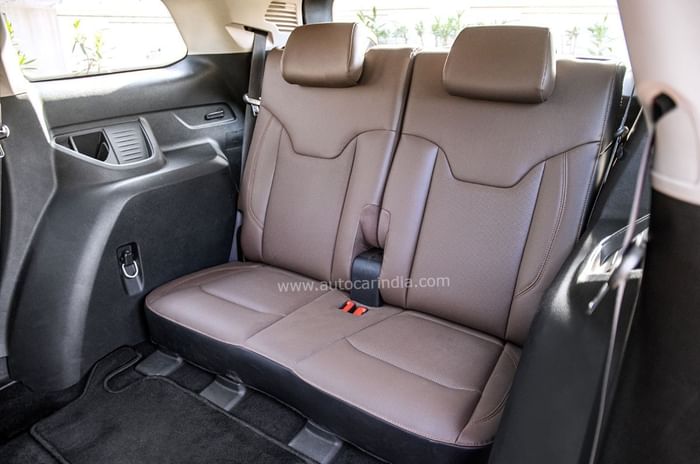
The third row is quite disappointing when you consider the space on offer in other 7-seaters. Sure, the one-touch or one-pull lever that flips and tumbles forward both sections of the 60:40 rear seat base makes it easy to access the last row, but the low roof forces you to contort a fair bit to wiggle inside. You get roof-mounted air-con vents served by a separate blower and evaporator, so staying cool is not a problem. What is a problem is the overall space crunch in the third row. The seats are placed on the floor and that pushes your knees up and against the middle-row seat back. You’ll struggle to find place for your feet. It’s not a place where adults can travel long distances in comfort and is best left for children or for luggage.
The Meridian makes a better case for itself as a 5-seater, with the rearmost seats folded down to offer 481 litres of luggage space. That said, even with the third-row seats in place, there’s enough space for a couple of soft bags. A nice touch is the powered tailgate, which has the button inside the cabin and not on the tailgate itself, so you don’t have to reach up high to activate it.
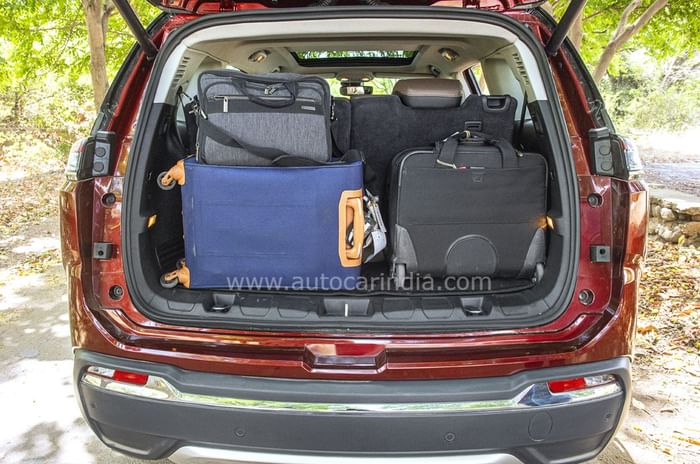
Jeep Meridian: engine and performance
The Meridian comes with just one engine option, the same 170hp, 2.0-litre diesel that powers
the Compass. But unlike the latter, the Meridian doesn’t get a petrol motor and is unlikely to get one soon. What you do get are multiple transmission options – the 4x2 gets a 6-speed manual gearbox, as well as the 9-speed auto, whilst the top-of-the-line Limited 4x4 only comes with a 9-speed auto, and that’s the one we drove.
A remapped ECU and different engine calibration have substantially changed the power characteristics of the tried-and-trusted 2.0-litre diesel in the Meridian. The power delivery is more measured compared to the Compass, which feels more responsive off the line. Jeep engineers say that they have opted for a more linear power delivery in the Meridian for a smoother drive. The fuel-injection timing too is less abrupt, which has marginally reduced noise levels.
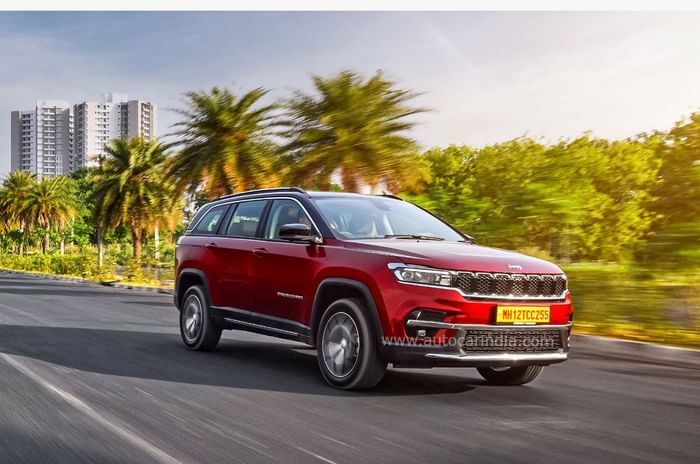
The Meridian is a touch quieter than the Compass, but when you rev the engine hard, the characteristically gravelly, diesel drone is quite audible. If anything, the Meridian’s performance feels a bit blunted compared to the Compass, a result of the extra 110kg of weight and softer engine calibration. In isolation though, the Meridian doesn’t feel underpowered in the least. The torquey 350Nm diesel gives you a nice tug from low speeds, all the way to the 4,500rpm redline. But whilst the Meridian feels strong and has enough oomph, it doesn’t feel particularly sporty, and that’s down to the rather lazy 9-speed gearbox.
Like in the Compass, this 9-speeder is in no hurry to swap cogs and is slow to react during both, downshifts and upshifts. As a result, the Meridian is not a very sporty or engaging SUV and feels happiest cruising all day long. The Meridian is, in fact, a brilliant highway car, the punchy diesel engine coupled with tall gearing makes long distance drives ever so effortless, and the brilliant dynamics play more than a supporting role.
Jeep Meridian: ride and handling
The Compass is known for its ride and handling, but the Meridian takes it up to an altogether different level. Stability on any surface is simply phenomenal and the way the Meridian flattens any road is astonishing. You really don’t have to worry about broken roads, or flinch when you hit a pothole or are forced off a narrow road by an oncoming truck. The Meridian’s beefy independent suspension, which comes with Frequency Selective Damping (FSD) and Hydraulic Rebound Stoppers (HRS), just soaks it up.
There is an underlying firmness to the ride, which isn’t buttery soft, but unlike the Compass, which had a hard edge, the Meridian’s suspension set-up has more compliance. Also, the Meridian has less vertical movement than the shorter-wheelbase Compass, and hence, passengers too feel more settled.
The confidence the Meridian gives you though corners is amazing too. There’s minimal body roll, the steering is accurate with lots of feel, and the big Jeep resolutely holds its line. The brakes too are progressive and it’s the predictability of the Meridian, the fact that it won’t behave erratically or throw up any surprises when the road surface suddenly changes, that really wins your heart. There’s simply no other SUV in this category or even a segment above and below that rides and handles with such aplomb.
If the Meridian is a class act on road, then off-road it’s the star of the show. A superbly curated off-road track outside Chandigarh was a great opportunity to test the Meridian’s 4x4 capabilities. Whether it was crawling up steps, see-sawing over ‘axle breakers,’ scrabbling up and down steep slopes, wading through water troughs or raising an articulated wheel like a dog trying to mark its territory, the Meridian did it all without breaking into a sweat. I didn’t even need to select ‘4x4 low’! You get multiple drive modes (Sand/Mud, Snow and Auto) but most owners will stick to the default Auto setting, which maximises traction automatically depending on the surface you’re driving on.
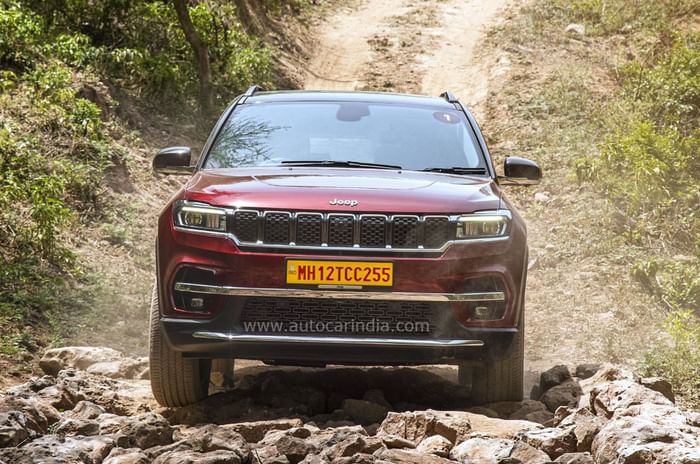
The Meridian is a Jeep first and an SUV next, which means it has to have all the 4x4 hardware that lives up to the brand’s legacy. Not that owners will use it, but it’s a bit of insurance in your back pocket, so it’s good to know what the Meridian is capable of.
Jeep Meridian: should you buy one?
The Meridian is a highly capable SUV whose blend of on-road and off-road dynamics is unmatched. This make it a brilliant car for long distances, irrespective of how good or bad the road surface is. Performance is adequate, but you do wish that with an increase in size and weight, came an increase in power and performance. There is no petrol option either, which would preclude a section of buyers who have moved away from diesel.
The well-built and well-equipped cabin has the added versatility of a third row, but the space on offer doesn’t make it practical for adults. The selling point of the Meridian is its Jeep DNA. It looks terrific and has a delightful, tough feel. And if you want to play mountain goat, it easily can. What’s also impressive is how good a city slicker the Meridian is. It’s easy to punt around narrow roads and doesn’t feel cumbersome like the Fortuner.
Available in two variants, Limited and Limited (O), the Meridian, which has no direct competition given its unique set of talents, has the makings of a winner. Priced competitively from Rs 29.90 lakh to Rs 36.95 lakh (ex-showroom, India), it undercuts the Fortuner by quite a margin. And like we said, with the Endeavour gone and the Kodiaq not available, there is little choice in this segment. At this price, with its great ride and handling, tough build and off road prowess, the Meridian is a good buy.
Tech Specs 
Copyright (c) Autocar India. All rights reserved.


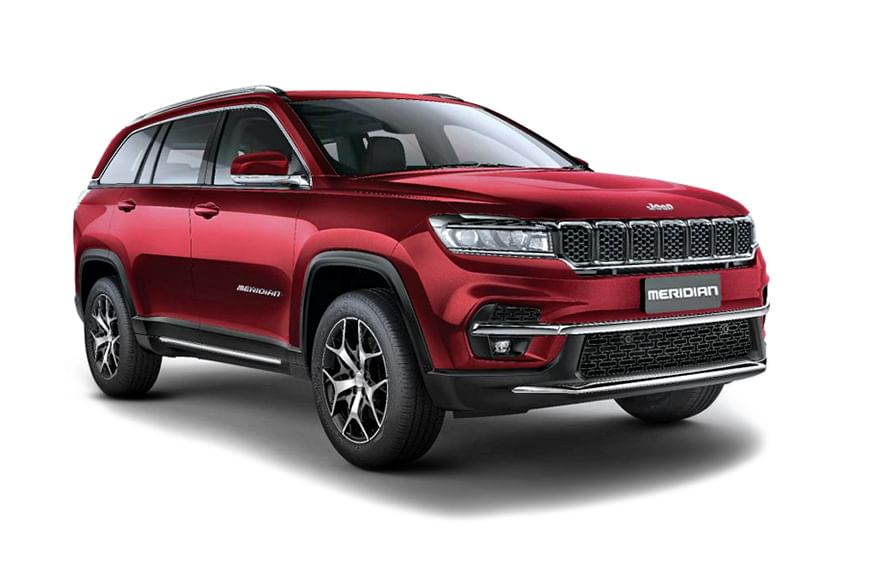





 Engine
Engine Transmission
Transmission Dimensions
Dimensions
Comments
Member Login
Personal Details
No comments yet. Be the first to comment.